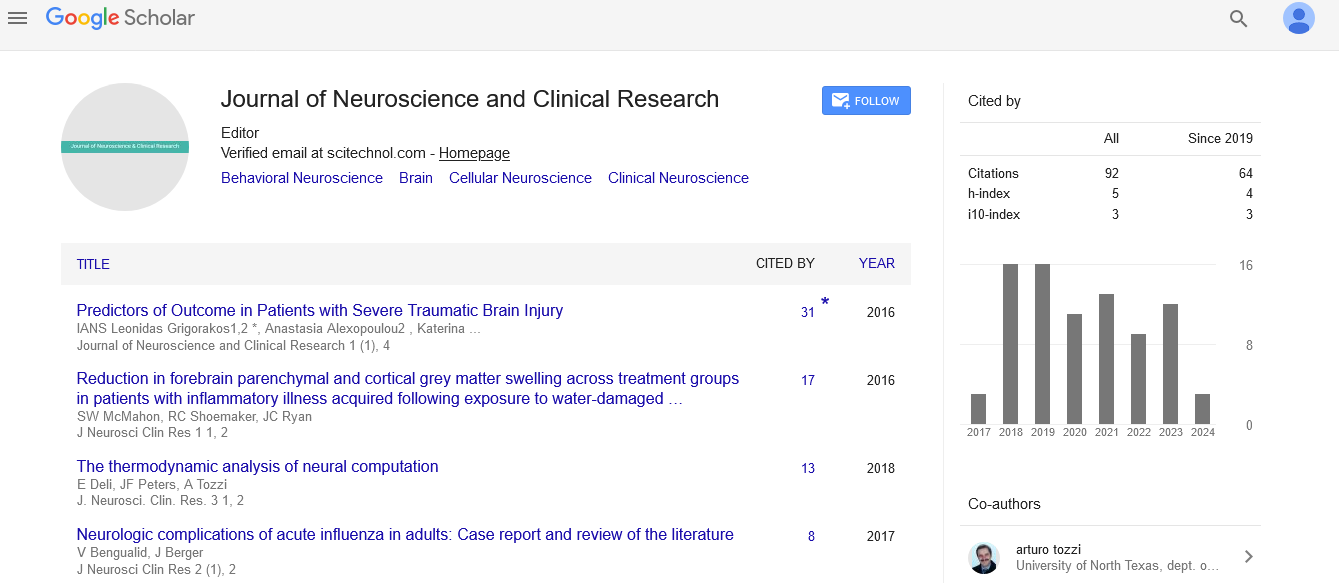Commentary, J Neurosci Clin Res Vol: 6 Issue: 5
Pharmacological Elevation in Neuroscience
Lucia M. Vaina*
Departments of Biomedical Engineering, Boston University, USA
*Corresponding Author:Lucia M. Vaina
Departments of Biomedical Engineering
Boston University
USA
Email: vaina@bu.edu
Received date: September 07, 2021; Accepted date: September 22, 2021; Published date: September 29, 2021
Citation:Vaina LM (2021) Pharmacological Elevation in Neuroscience. J Neurosci Clin Res.Vol.6 No.5.
Abstract
Although substantial advances have been made in behavioral and pharmacological treatments for addictions, moving treatment development to the next stage may require novel ways of approaching addictions, particularly those derived from new findings regarding of the neurobiological underpinnings of addictions, while assimilating and incorporating relevant information from earlier approaches. In this review, we first briefly review theoretical and biological models of addiction and then describe existing behavioral and pharmacologic therapies for the addictions within this framework. We then propose new directions for treatment development and targets that are informed by recent evidence regarding the heterogeneity of addictions and the neurobiological contributions to these disorders.
Keywords: Pharmacological Elevation, Neuroscience, Alcoholics, Anonymous
Introduction
Although substantial advances have been made in behavioral and pharmacological treatments for addictions, moving treatment development to the next stage may require novel ways of approaching addictions, particularly those derived from new findings regarding of the neurobiological underpinnings of addictions, while assimilating and incorporating relevant information from earlier approaches. In this review, we first briefly review theoretical and biological models of addiction and then describe existing behavioral and pharmacologic therapies for the addictions within this framework. We then propose new directions for treatment development and targets that are informed by recent evidence regarding the heterogeneity of addictions and the neurobiological contributions to these disorders.
The treatment for addictions can be divided into three phases: detoxification, initial recovery and relapse prevention. The first phase, detoxification, has the goal of achieving abstinence that is sufficiently sustained to yield a safe reduction in immediate withdrawal symptoms. The second phase, initial recovery, has goals of developing sustained motivation to avoid relapse, learning strategies for tolerating craving induced by external or internal cues and developing new patterns of behavior that entail replacement of drug-induced reinforcement with alternative rewards. The third phase, relapse prevention, takes place after a period of sustained abstinence, and requires subjects to develop long-term strategies that will allow them to replace past drug behaviors with new, healthy behaviors. As discussed above, the drug addiction cycle is maintained through repeated use and alterations to motivational neurocircuitry, including dopaminergic systems. Given the need to disengage from sustained patterns of use and related neuroadaptations, detoxification frequently requires pharmacological intervention.
These initial drug treatments may involve choosing a replacement substance that has a similar mode of action on the neurobiological substrate, while having a slower and more sustained effect. Behaviorally speaking, this results in withdrawal symptoms that are made less acute but more prolonged and gradual. For example, drugs with longer half-lives than herion (e.g., methadone) can be used in addicted individuals during detoxification. Successful resolution of detoxification requires sustained motivation to tolerate withdrawal symptoms. The second phase, initial recovery, is often aided by external, structural controls (e.g., hospitalization) which limit access to drugs once withdrawal symptoms have been alleviated. Yet, ultimately, the initial recovery phase must teach the addicted individual ways to sustain motivations to avoid relapse, learn strategies for tolerating and resisting drug cravings induced by external or internal cues and develop new patterns of behavior that entail replacement of drug-induced reinforcement with alternative rewards. Learning these new behavioral strategies can also be aided by the longer term administration of medications such as those used in the detoxification process (e.g., drugs that block or reduce drug rewards, reduce craving by substituting for drug effects) or by the additional augmentation with drugs that help to reduce mental and physical symptoms not necessarily related to drug use (e.g., independent depression or anxiety disorders). The third phase, relapse prevention, is perhaps the most difficult to achieve given the long-term brain adaptations resulting from sustained drug abuse. Indeed, relapses often occur and many relapse prevention programs involve a continued support system (e.g. Alcoholics Anonymous, etc) to aid in maintaining new behaviors developed during initial recovery.
Threats to recovery involve both external and internal cues that lead to waning motivation, attenuation of external or internal controls and revival of associative learning cues linking drug use to hedonic experiences, and can be triggered by both external cues and internal cues. External cues include exposure to drugs or to people, places or things associated with drug use. Internal cues include hedonic experiences that may be enhanced by resumed drug use or dysphoric experiences that may be mediated by such factors as stress, interpersonal conflict or symptoms of comorbid mental disorders such as depression.
 Spanish
Spanish  Chinese
Chinese  Russian
Russian  German
German  French
French  Japanese
Japanese  Portuguese
Portuguese  Hindi
Hindi 